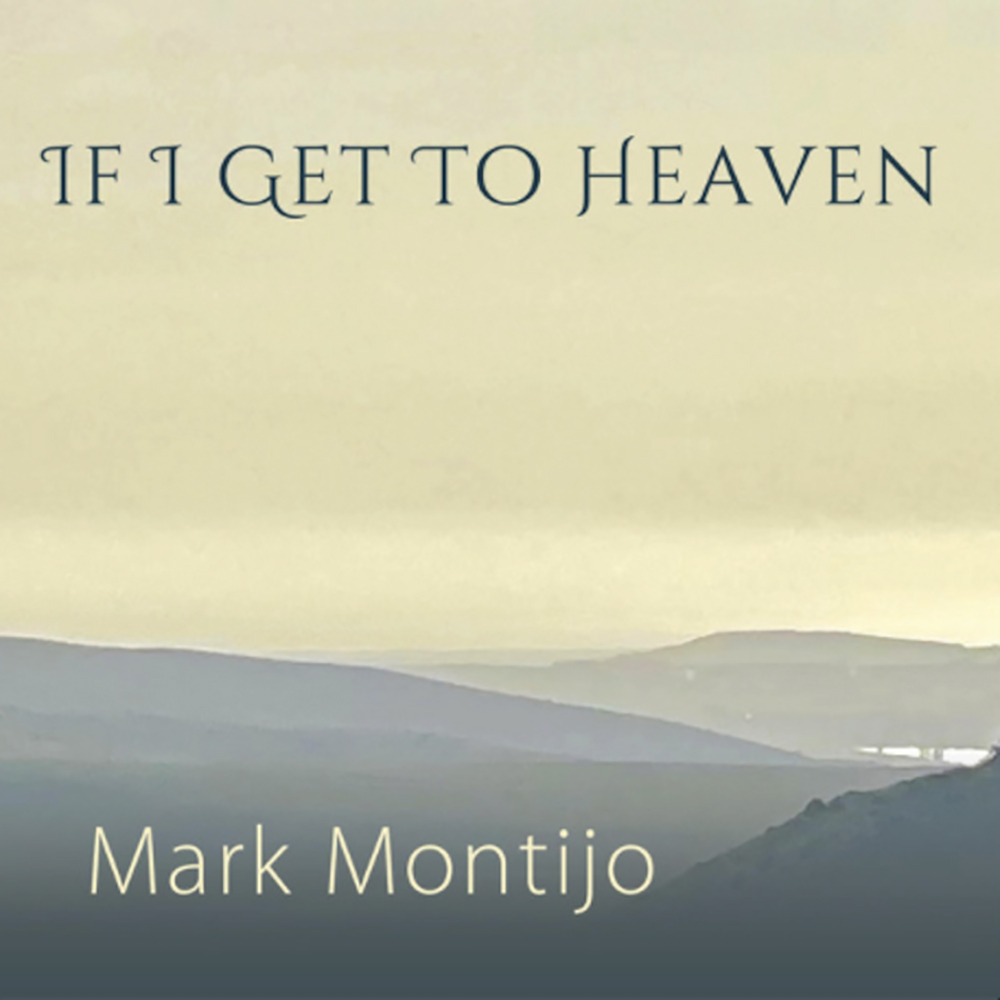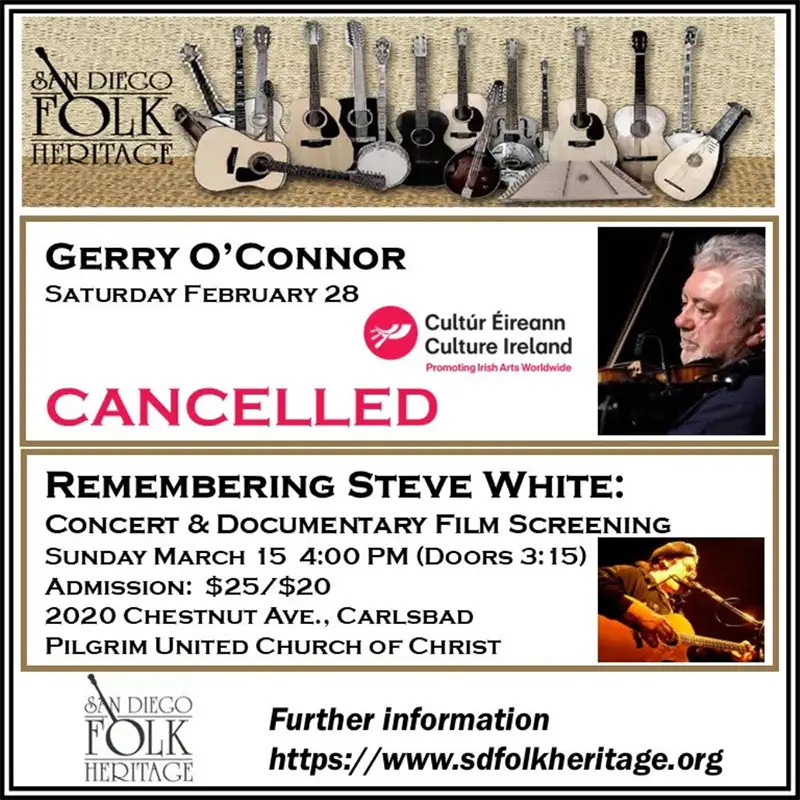CD Reviews
MARK MONTIJO: If I Get to Heaven

Listening to Mark Montijo teaches me that less is definitely more and that his simplicity delivers a whole lot of satisfaction. The album clocks in at 40 minutes, and I welcome each of the 11 stops with anticipation. The arrangements are comfortable and easy on the ears. They lead me gently yet deceptively along paths to the seaside, through societal tragedy, and to contemplate more than one family tree. Unsuspectingly, I am drawn in, only to find myself confronting topics far heavier than what I first perceived. Montijo’s voice breaks and falters unapologetically, delivering the weight of each moment with raw sincerity. More than once, I find that I’m struck by lyrics, which, at first glance, seem so commonplace, yet they are meticulously crafted—perfectly hewn, like timber shaped to build a fine home. That’s it! This album feels like home.
The first song, “Lost Art,” starts off with Rick Schmidt on pedal steel, joined by Phil Gross on acoustic electric bass, and Montijo’s own fingerpicking on guitar. As he begins to sing, his voice is crystal clear and achingly insistent, although slightly rough around the edges, giving it a conversational feel. I have heard him play this song live many times, so I don’t know how long ago he wrote it, but it rings current.
Well, the world is going crazy, and the news is usually bad.
The truth’s a little hazy these days, you know, the truth’s a little sad.
Seems like love’s a lost art, and it feels like hate will win.
Then I look into your eyes, deep with wonder and surprise, and I fall in.
Oh, that last line is so all-encompassingly complete, it makes me shudder. Robert Sale adds drums with brushes at the first chorus, giving it just enough extra rope to pull me along, with dobro accents laid between wide open sweeps of pedal steel. They step back at the second verse, as Sharon Whyte on keys takes their place, lightly emphasizing the downbeats and adding flourishes, developing a vulnerable, contemplative mood. The pre-chorus is hopeful, and his voice cracks as he surrenders; knowing she can fix anything. When love is just a lost art, as the darkness settles in. Through the silence and the gloom, you walk into a room, I follow you in. As it goes along, the song fills up with more instruments, but nothing’s in the way; the arrangement has direction and purpose. At 2:29, the chorus begins again, but this time Cathryn Beeks contributes her background vocals, blending warmly in her smooth tones with Montijo’s gravel, and they continue together through the bridge. For the first half of the last chorus, only keys and guitar accompany Montijo as he sings through the openness; drums, bass, pedal steel, and dobro reunite with him mid-chorus. He repeats the last line, If nothing else comes true, I’ll be lost somewhere with you.
The title track, “If I Get to Heaven,” opens with Montijo eloquently picking guitar. I shake my head in wonderment. His fingers feather the fretboard with ease and purpose as he plays what seem to be simple notes and patterns, yet they hit me at some deep, DNA-level frequency, like a tuning fork against my skull. It’s perfect. Sparse keys come in after the first verse, joined by dobro and bass when he starts to sing again. Broadly philosophical yet poignantly personal, Montijo challenges religion and its contradictions with innocent, childlike musing.
Now there’s lots of hopeful people hanging on a wire,
while angry men with microphones are preaching to the choir.
They’re talking about family values; talking about hate and hell;
talking about salvation and I hope it turns out well.
Then in the end, he does have a plan.
But if I get sent to heaven, and it’s the heaven they’ve been selling on TV.
I’ll walk up to Jesus’ gate, ask him what’s with all this hate,
and where are all my good friends supposed to be?
And what the hell are we doing here, you and me?
The second verse brings in minimal drums. The bass slowly builds to the instrumental space at 2:07. With just guitars and dobro, the section moves along remarkably hymn-like, with classical touches, until it’s back to the chorus. Finally, he ends the song nearly the same as he began it.
If I get to heaven, I’ll walk down every street.
If they’re speaking English, I’ll tell everyone I meet,
that I wish them well.
Between the round and round fingerpicking on guitar and the more pronounced bass, “Big Night” seems to jostle and roll right from the beginning, a consistent forward movement. The lyrics paint a scene in my mind, clear as day, of open fields and space between houses and folks who’ve known each other forever, coming together for the big night. I’ve been to enough hand-clapping revivals to sense that energy here. Lenny Bole comes in early on banjo, further providing strong melodic brush strokes for painting the song. The chorus arrives after just one verse and it is lush with multi-part harmonies by Bole, Jim Soldi, and Montijo. Together, they sound as full and rich as a deep wooden instrument; it’s a highlight for me. Somewhere between memory and prophecy, Montijo is able to address an uncomfortable reality in a down-to-earth manner, as though he’d lived it himself. Oh, but didn’t we all?
The people’s champion came to town,
ridiculed his rivals and he looked like a clown.
But he held our attention while he fed our fears,
and everybody heard what we wanted to hear.
We’d been waitin’ for somethin’.
Those lovely voices come back at the chorus again and continue through the bridge.
The people’s champion dressed up nice,
shook everybody’s hand, he shook mine twice.
Talked real loud, made stuff up,
head in the clouds and feet in the mud.
Just waitin’.
A final chorus finishes the piece.
It was a big night in a small town,
lots of big ideas at the fairground.
Lots of easy answers for hard, hard times.
Big night, small town. Big night, small town.
Fingerpicking guitar and piano start and stop to set the stage for the faltering opening scenes of “Zero to Sixty.”
He’s a drifter who’s drifted too far.
He’s a singer who sings out of tune.
He’s an old friend who falls, as he stumbles down halls.
He’s a houseguest who sleeps until noon.
Dobro joins them on the second verse, filling in the space, almost swooning; drums and bass come in at the chorus. The instruments fill in further on the third and fourth verses, and the momentum makes me realize the protagonist is barreling down the rugged hill of his life and would never dream of putting the brakes on. The chorus brings it home.
But he’s gone from zero to sixty in record time,
from his first breath to his last dime,
from his mama’s warm breast to the soup line,
from bottle to bottle again.
Beeks flavors it with multi-track harmonies and becomes especially angelic in the bridge, before continuing with a subtle tone for the rest of the song. Montijo has a few recurring themes or mentions through the album, some barely there, but I still hear them. Perhaps his family history of saddle making not only inspires references to cowboys but also gives him a sense of what one might need, as expressed in the bridge.
Sometimes he’s pitiful, most times he’s high.
When the best of the best is the worst thing that money can buy.
But sometimes he’s beautiful, and frequently kind.
And when sober, well, he’s the best friend a cowboy can find.
Religion is another theme that weaves its way through this album, and it leads him to add a perfect, punctuation-like ending to this song: Amen. I love that!
The last song is lighter, like a new day. “Summer Sun” starts with just fingerpicking on guitar and shaker egg, as Montijo sings an interesting set of rhymes that magically work.
It was hotter by the water than I thought it ought to be.
And I brought you ‘cause I thought you might be who you might be.
This is the history of a longtime love that, much like the movement of the song, pushes happily forward. I feel the hopeful beginning, the blossoming, and the comfort of years as reliable as the returning summer sun. His lyrics emphasize the beauty of who she is and what makes her special, and, almost as a bystander, he’s humbled and grateful to be involved. Dobro joins him at the chorus with single bending notes, followed by bass and drums at the second verse. The sound is clear and open, expressing joy. Beeks furthers that feeling as she harmonizes with him at the second chorus and through the bridge.
Well, I never thought I’d have a life like I’ve had with you.
And I never dreamed we’d have a child I love the way I do.
And the weather never meant that much to me,
but every change that touches you, changes what I see.
At the beginning of the last chorus, his voice breaks so dramatically that it solidifies my notion that this song is all about her and that he doesn’t mind falling short.
And the summer sun shines down,
the summer sun warms the summer ground.
The summer sun shines down on you.
If I Get to Heaven was recorded, mixed, and mastered by Soldi in his studio. From the balance of instruments and voices, the clarity of the sound, and even the song order, everything is just right and well worth listening to. Additional tracks include: “Music You Could Die For,” a bolder and darker piece both musically and lyrically, featuring strong bass lines and Bole on lap steel; “Picture This,” which addresses the plight and poor treatment of immigrants at the hands of the authorities; “Someone Can Fly,” with Soldi on rhythm guitar, a beautiful anthem to Montijo’s family’s own immigration story and the contributions they’ve made to life here; “At the Top of My Game” which brings in Doug Powell on viola and explores the subject of new love; “Horse Named Lefty,” cowritten with Gross, another cowboy song featuring viola, banjo, and all the guys singing background harmonies; and “Tea Time in Texas,” a wild romp of a song that makes me think of tea with the mad hatter. Everyone is out of character, as the title suggests, countering the refined image of traditional British teatime with the rugged, larger-than-life culture often associated with Texas. You can listen to the album on all streaming platforms or request your very own hard copy CD by messaging him on Instagram @rabbithavenmusic. Whichever you choose, go listen now.








